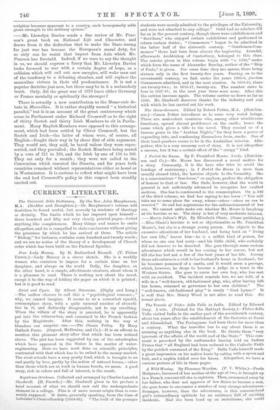I Forbid the Banns. By F. Frankfort Moore. 3 vols.
(Hutchin- son and Co.)—Mr. Moore has discovered a novel motive for a story. Commonly, it is the hero who tries to avoid the bondage of matrimony ; in I Forbid the Banns (a more than usually absurd title), the heroine objects to the formality. She is a conscientious free-lover," or anyhow, prefers the obligation of honour to that of law. She finds, however, that the world in general is not sufficiently advanced to recognise her exalted motives. She has to condescend to the commonplace. On p. 34tt of the third volume, we find her saying to her lover : "You will take me to some place far away, where—where —where we can be married." So end her aspirations for the enfranchisement of her sex. We cannot quite make out whether Mr. Moore is laughing at his heroine or no. The story is but of very moderate interest. —Morris Julian's Wife. By Elizabeth Olmis. (Same publisher.) —Miss Olmia's heroine is not so objectionable as Mr, Frankfort Moore's, but she is a strange young person. She objects to the excessive attentions of her husband, and being bent on " living her own life," leaves him—he is a selfish kind of person, for whom no one can feel sorry—and his little child, who certainly did not deserve to be deserted. She goes through some curious adventures which result in her coming to her senses, but not till she has lost not a few of the best years of her life. Among these adventures is a visit to her husband's home in Scotland; for he becomes possessed of a castle, and it would seem a peerage, which, however, he drops to become a judge in a town in the Western States. She goes to nurse her own boy, who has met with an accident. The incident reminds her, we are told, of a wife in a "well-known, old-fashioned play, who, after having left her house, returned as governess to her own children." The "well-known, old-fashioned play" is surely 'East Lynne." It is well that Mrs. Henry Wood is not alive to read this. Sic transit gloria.






































 Previous page
Previous page